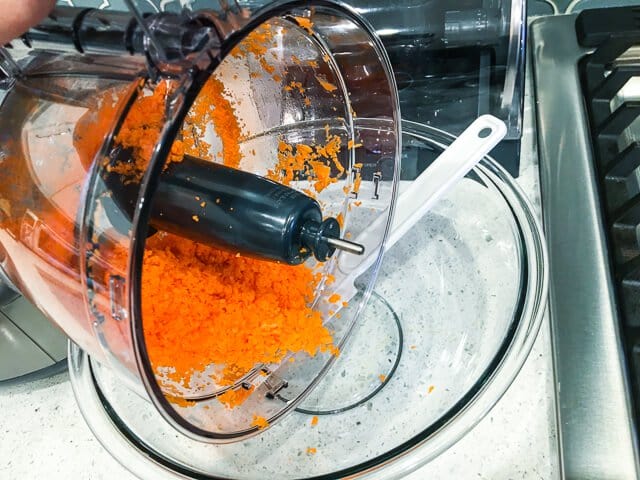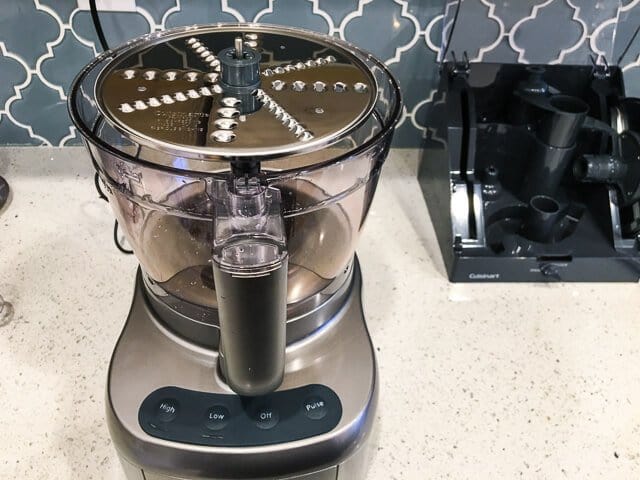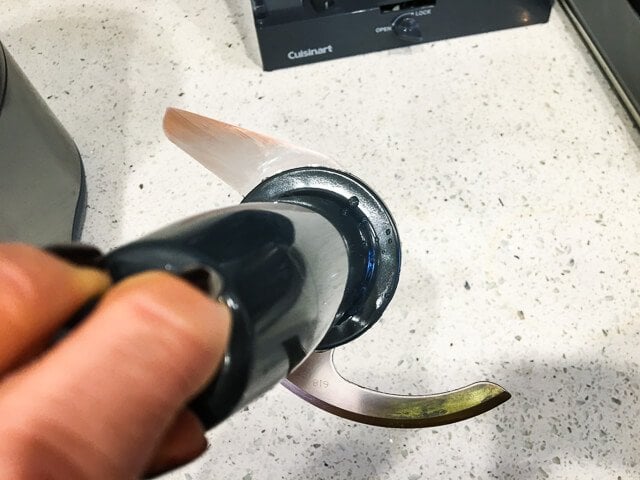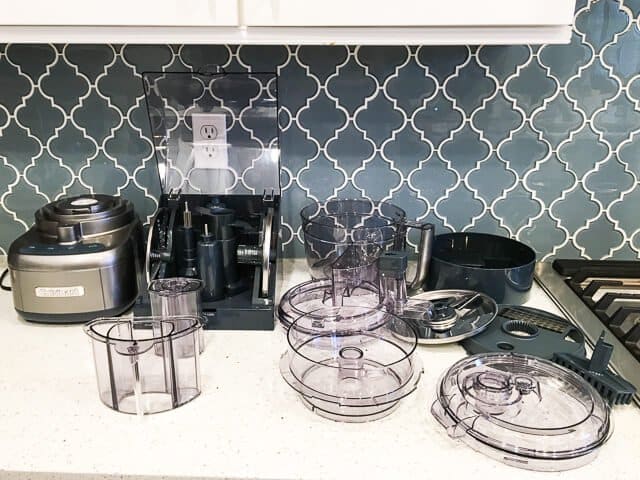A good food processor is like the Swiss Army knife of the kitchen – it can chop, slice, dice, knead, and puree with ease. But if you’re unfamiliar with how to use your food processor or you don’t know about all the kitchen tasks it can accomplish, there’s a good chance your handy appliance is sitting around underutilized.
Unlocking the true potential of a food processor goes way beyond the basics of food prep. In this handy guide, we’ll walk you through the ins and outs of harnessing the full power of your food processor, opening doors to this versatile kitchen appliance.
How to Assemble Your Food Processor:
Alright, let’s break it down. When it comes to putting together your food processor, think of it like a culinary puzzle – with delicious results at the end!
- Lay out all the attachments on your countertop, ensuring nothing’s left out.
- Slide the main bowl into place, making sure it clicks securely onto the base. Some man
- Choose the metal blade that suits your culinary adventure – whether it’s the standard S-blade which is a great multi-purpose blade or a specialized shredding disc.
- Secure the lid tightly to avoid any messy mishaps during operation. Whether you are using a mini chopper or large food processor you turn the lid to lock and you will hear a click when the lid is secured.
- Refer to the manual for model-specific tips and tricks to make the most out of your food processor. Every food processor has its own little quirks.

Essential Food Processor Skills
The best food processor boasts an impressive repertoire of abilities, making it a jack-of-all-trades in the kitchen. Let’s dive into some fundamental techniques you can master with this versatile kitchen appliance.
- Chopping The trusty S-shaped blade also known as the Sabatier blade takes center stage for chopping duties. Simply pulse your ingredients in short bursts until they reach your desired chop size. Great for tackling a whole onion without any tears!
- Slicing Harness the slicing disc to achieve uniform slices. Adjust thickness with ease using the handy thickness adjustment lever.
- Shredding For effortless shredding of cheese, veggies, or fruits, turn to the shredding disc.
- Grating Achieve perfectly grated cheese, veggies, or fruits with the grating disc.
- Blending Craft silky smooth smoothies, sauces, and liquids using the pulse button and S-blade combo for solid ingredients. Homemade peanut butter anyone?
- Mixing Whip up pizza or bread dough, cake batter, and more with the versatile S-blade.
- Kneading No dirty hands! Let the kneading setting whip up delicious bread dough, pizza dough and other baked delights, using the dedicated plastic dough blades.
- Whipping Create fluffy whipped cream, meringue, and other airy mixtures with the help of the whipping disc.
- Pureeing Achieve velvety smooth purees with ease using the trusty S-blade. Perfect for your own homemade mayonnaise and delectable salad dressings.

Adding Ingredients to a Food Processor
With lots of recipes at your fingertips, you’ll find a myriad of culinary possibilities to explore. Here are some best options for adding ingredients to your next creation.
- Some recipes may recommend pre-chopping certain tough ingredients before adding them to the processor, especially for larger vegetables that may require a quick dice to fit through the feed chute.
- When introducing your veggies and other goodies to the food processor, exercise caution. Keep your digits clear of any blades and always utilize the pusher tool to guide ingredients down the chute as needed.
- Don’t overlook the wonders of the pulse function for achieving chunkier textures in salsas and soups. This function is the best way to add depth to your culinary creations and your dish will have appealing uniform pieces.
- Alternatively, use those speed settings! Crank up the speed for tasks like crafting homemade hummus, sauces, and salad dressings. This high speed works wonders on thoroughly incorporating all the flavors of your creation.
- Avoid overloading the machine by adding too many ingredients at once, as this may overwhelm it and cause the motor to burn out.
- Should your food processor emit peculiar noises while ingredients are being added via the feed tube, it may be a subtle nudge to grab your cutting board and give those ingredients a quick chop. This can be especially true for older models but is best practice regardless of the size of your food processor.

What Can I Use My Food Processor For?
Small jobs, big jobs and not just meal prep! Here’s a rundown of some everyday magical things your processor can effortlessly conquer including your favorite dishes.
- Grating Parmesan cheese: Sure, handheld graters have their charm, but when you’re dealing with hefty amounts of finely grated cheese for your pasta, speed is of the essence. Chunk up your wedge into a smaller size, toss it into the processor with the standard sharp blades, and give it a whirl. Control the texture with a few strategic pulses. (This trick works wonders for other hard cheeses too!)
- Kneading dough: Say goodbye to forearm workouts! Let your food processor’s dough attachment handle the heavy lifting when it comes to bread, pizza or pasta dough, or even a flaky pie crust. And if you’re whipping up a crumbly graham crackers cheesecake crust, the standard blade has your back.
- Mincing herbs: No more bruised basil or parsley! Let your trusty food processor blades do the delicate mincing work for herbs like cilantro, basil, or parsley without the risk of overdoing it using the pulse option.
- Dressing and dip duty: Ever noticed those handy chutes in your food processor’s feed tube? They’re perfect for slowly incorporating oil into the mix, essential for silky mayonnaise or dreamy Caesar dressings. Personally, I’m a fan of whipping up chimichurri and an array of flavorful dips and great sauces. That handy chute allows you to use enough liquid a little bit at a time.
- Mixing up cookies and light batters: Keep it simple with cookie recipes that don’t weigh you down with excessive butter, chocolate chips or even flour – your food processor can handle it. Plus, it’s a lifesaver for tasks like shredding carrots for a delectable carrot cake or playing a supporting role in larger recipes.
With your trusty food processor by your side, culinary conquests await – no knife skills required!

Food Processor Mistakes To Avoid
While top-tier food processors boast durability and versatility, they’re not invincible. To ensure optimal performance and extend the lifespan of your appliance, steer clear of these common blunders:
- Skipping the prep work: Before tossing anything into the processor, take a moment to chop your ingredients into manageable 1-2 inch pieces. This especially applies to tough customers like uncooked meat you want to turn into ground meat and sturdy veggies such as carrots and potatoes. For softer meats and cheeses, a brief stint in the freezer can work wonders, ensuring smoother processing.
- Ignoring the pulse: Embrace the pulse button for more controlled processing. This nifty feature works wonders for achieving uniform pieces, particularly handy for delicate tasks like prepping bruschetta or finely dicing meats without turning them into a mushy mess. If your processor lacks an automatic pulse setting, no worries – just tap that main control button intermittently for similar results.
- Easy does it: When shredding or slicing, resist the urge to apply excessive pressure. Let the processor take the lead while gently guiding your ingredients with the pusher. Consistent pressure yields the most even results, ensuring picture-perfect slices every time.
- Pack it in: For flawless slicing and dicing, pack your ingredients snugly into the feed tube before gently pressing them down with the pusher. Opt for the appropriate section of the feed tube to accommodate your ingredients, securing them in place as they make their journey through the processor.
- Know your gadgets: While both the food processor and blender have their merits, it’s essential to understand their strengths. If you’re aiming for a coarse texture, your trusty food processor is the way to go. Blenders, on the other hand, excel at creating silky smooth purees and finely grinding ingredients, especially those with added liquid.
- Stay present: Don’t leave your food processor unattended, especially during heavy-duty tasks like kneading yeast dough. Neglecting your appliance’s needs could lead to it taking an unexpected stroll off the countertop, resulting in a messy disaster and potential damage.
By steering clear of these pitfalls and embracing proper usage techniques, you’ll ensure your food processor remains a valued kitchen companion for years to come.

Food Processor Safety Guidelines
Just like with any other kitchen gadget (think Instant Pot or the like), safety comes first when it comes to using your food processor. Here are some key tips to keep in mind:
- Respect the spin: Keep your hands, spatulas, and other utensils at a safe distance from that whirring knife blade. And remember, never poke around inside the machine while it’s still plugged in and active.
- Bowl first, blades second: Always ensure the work bowl is securely in place before attaching the blades and firing up the processor.
- Push with care: When adding ingredients, let the food pusher do the heavy lifting – never insert your fingers into the feed tube or work bowl while the machine is plugged in.
- Power down for cleanup: Before removing food or disassembling the food processor for cleaning, make sure it’s powered off and unplugged.
- Bowl before blades: After you’re done using the food processor, remove the work bowl from the base before tackling the discs or blades for cleaning. Safety first, always!
Cleaning Guidelines:
For best results in cleaning your new food processor sticking to these guidelines can ensure your food processor remains a safe and efficient kitchen companion. And don’t forget to peruse the manufacturer’s instructions before diving into your first food-processing adventure! Here are a few good housekeeping tips regardless of the food processor models.
- Disconnect your food processor from the power source.
- Take out the work bowl and work bowl lids.
- Give the work bowl and lid a good scrub in warm, soapy water, ensuring thorough rinsing. Make sure the top of the bowl gets a good scrubbing too.
- Use a damp cloth to wipe down the base of the food processor; avoid immersing it in water.
- Many food processor components have dishwasher-safe parts but it’s good practice to allow all components to air dry completely before stashing them away.

Conclusion
Well, folks, there you have it—the ultimate beginner’s guide to using a food processor like a pro. Whether you’re a seasoned home cook or just dipping your toes into the culinary world for the first time, I hope you’ve found some valuable tips and tricks to get the most our of this versatile kitchen appliance.
Now it’s your turn! Do you have any favorite recipes or tips for making the most of your food processor? Whats your best option for the type of brand you love? Share your thoughts in the comments below—I’d love to hear from you. Until next time, happy cooking!
Easy Recipes Using Your Food Processor:
The post A Beginner’s Guide On How To Use A Food Processor appeared first on Steamy Kitchen Recipes Giveaways.
from Steamy Kitchen Recipes Giveaways https://ift.tt/Agc9DlX
via New Kitchen Special
No comments:
Post a Comment